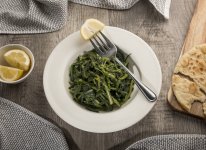mastichas09
Active member
I love making boiled greens in the Greek way. With my healthy eating resolutions, I thought I would put together an explanation of how I make it:
First, choose the greens for your recipe. The traditional greens for Horta are dandelion, nettle, mustard, and chicory greens. You can combine them or use one of them in the recipe. Make sure to pick fresh and firm greens, and discard any wilted or yellow leaves.
Next, rinse the greens well and cut off the stems. In a large pot, bring water to a boil and add the greens. Don't forget to add the sea salt, which is a crucial ingredient for the recipe. Let the greens boil for about 15-20 minutes, until they're soft enough.
Now, it's time to prepare the dressing. In a separate pan, heat up the olive oil, add the chopped garlic and onion, and cook them until the onions are slightly softened. Then, add the red wine vinegar and take it off the heat.
Finally, drain the boiled greens well and add them to the pan with the dressing. Mix well until the dressing covers the greens. You can also add lemon juice, feta cheese, or any other toppings you prefer. Your delicious and healthy Horta is ready!

First, choose the greens for your recipe. The traditional greens for Horta are dandelion, nettle, mustard, and chicory greens. You can combine them or use one of them in the recipe. Make sure to pick fresh and firm greens, and discard any wilted or yellow leaves.
Next, rinse the greens well and cut off the stems. In a large pot, bring water to a boil and add the greens. Don't forget to add the sea salt, which is a crucial ingredient for the recipe. Let the greens boil for about 15-20 minutes, until they're soft enough.
Now, it's time to prepare the dressing. In a separate pan, heat up the olive oil, add the chopped garlic and onion, and cook them until the onions are slightly softened. Then, add the red wine vinegar and take it off the heat.
Finally, drain the boiled greens well and add them to the pan with the dressing. Mix well until the dressing covers the greens. You can also add lemon juice, feta cheese, or any other toppings you prefer. Your delicious and healthy Horta is ready!




